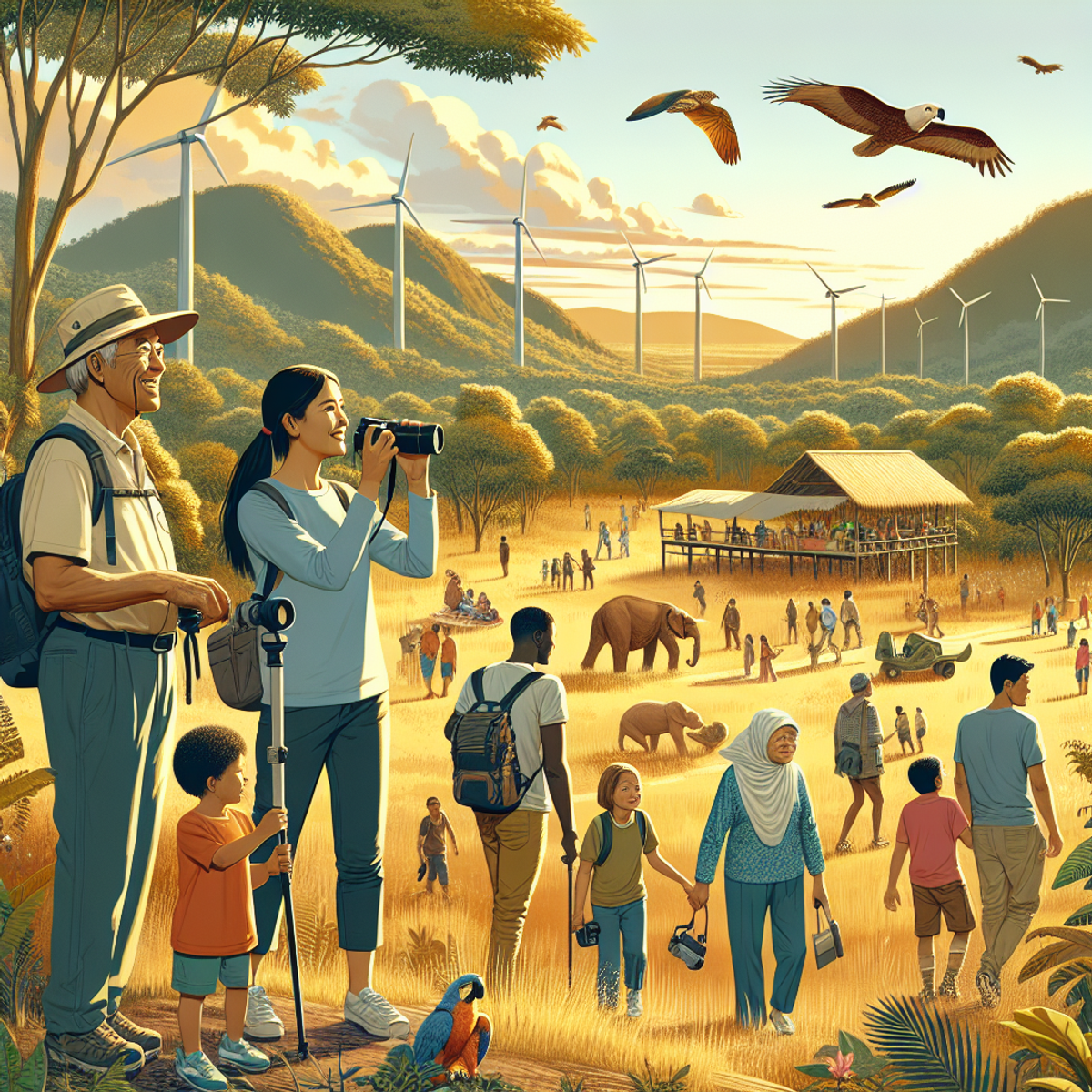Python and Sustainable Tourism: Eco-Lodges

Python and Sustainable Tourism: Eco-Lodges
Introduction
Ecotourism is a form of sustainable tourism that focuses on minimizing environmental impact, supporting local communities, and fostering cultural understanding. It promotes responsible travel to natural areas that conserve the environment and sustain local well-being while involving interpretation and education. By choosing eco-lodges as their accommodations, travelers can actively contribute to the preservation of the environment and the promotion of sustainable practices in the travel industry.
Python programming language, with its versatility and data processing capabilities, can be a powerful tool for enhancing the sustainability efforts of eco-lodges. By leveraging Python-based solutions, eco-lodges can optimize their energy consumption, develop smart waste management systems, and improve guest satisfaction. In this article, we will explore how Python can be used to advance the sustainability goals of eco-lodges and discuss the challenges and opportunities associated with implementing Python-driven sustainability initiatives.
Ecotourism: Promoting Sustainable Practices
Ecotourism plays a crucial role in promoting sustainable practices in the travel industry. It is founded on three core principles:
- Minimizing Environmental Impact: Ecotourism aims to minimize negative impacts on the environment through responsible resource use, waste management, and conservation initiatives. By choosing eco-lodges that implement sustainable practices such as energy-efficient designs and renewable energy sources, travelers can contribute to reducing their carbon footprint.
- Supporting Local Communities: Ecotourism focuses on supporting local communities by providing economic benefits through job creation, income generation, and capacity building. Eco-lodges often collaborate with local communities to ensure that tourism revenues are shared equitably and that cultural traditions are preserved.
- Fostering Cultural Understanding: Ecotourism encourages travelers to engage with local cultures and traditions, fostering mutual understanding and respect. Eco-lodges offer opportunities for guests to interact with local communities, participate in cultural activities, and learn about indigenous knowledge and practices.
Python: Enhancing Sustainability Efforts of Eco-Lodges
Python programming language offers a wide range of tools and libraries that can contribute to enhancing the sustainability efforts of eco-lodges. Here are some ways in which Python can be leveraged:
- Optimizing Energy Consumption: Python's data processing capabilities make it possible to analyze energy consumption patterns in eco-lodges. By collecting and analyzing data from sensors, Python can help identify energy-saving opportunities and optimize energy usage through predictive analytics. For example, Python-based algorithms can adjust heating and cooling systems based on occupancy patterns, leading to significant energy savings.
- Developing Smart Waste Management Systems: Python can be used to develop smart waste management systems that automate waste sorting, recycling, and composting processes in eco-lodges. By integrating sensors and machine learning algorithms, Python can help identify the most efficient waste disposal methods while minimizing the environmental impact.
- Improving Guest Satisfaction: Python can enhance guest experiences at eco-lodges by providing personalized recommendations and services. By analyzing guest preferences and behavior data, Python-based recommendation systems can suggest eco-friendly activities, local attractions, or sustainable dining options tailored to each guest's interests.
In the next sections, we will explore these use cases of Python in more detail and discuss the potential benefits that eco-lodges can derive from adopting Python-based solutions.
Understanding Ecotourism
Ecotourism can be defined as a form of sustainable tourism that focuses on responsible travel to natural areas. Its core principles revolve around minimizing environmental impact, supporting local communities, and fostering cultural understanding. This approach aims to conserve the environment, sustain the well-being of local populations, and involve interpretation and education.
Benefits of Ecotourism
- Biodiversity Conservation: Ecotourism plays a pivotal role in preserving the rich biodiversity of natural areas by promoting conservation efforts and minimizing human interference.
- Socio-Economic Development: It contributes to the economic development of local communities by creating employment opportunities and supporting small-scale businesses.
- Preservation of Indigenous Traditions: Ecotourism helps in preserving the indigenous traditions and cultural practices of local communities, thereby safeguarding their heritage.
Distinguishing Ecotourism from Mass Tourism
Ecotourism stands in stark contrast to mass tourism due to its conscientious behavior towards the environment and local communities. Unlike mass tourism, ecotourism prioritizes low visitor impact on the environment, culture, and biodiversity while actively involving locals in decision-making processes.
By aligning with these principles, ecotourism not only enables travelers to explore natural wonders but also ensures that their presence contributes positively to the destinations they visit.
Sustainable Accommodations in Sweden
Sweden is known for its commitment to sustainability, and this extends to its wide range of eco-friendly accommodations, especially eco-lodges. These accommodations not only allow visitors to experience the country's stunning natural landscapes but also give them a chance to support environmental conservation efforts.
Overview of Sweden's Leadership in Sustainable Accommodations
Sweden is leading the way when it comes to offering sustainable places to stay, making it a top destination for eco-conscious travelers. The country's dedication to preserving the environment and promoting responsible tourism is evident in the many choices of lodging available.
One type of accommodation that stands out is eco-lodges. These lodges have become increasingly popular among travelers who want to minimize their impact on the environment while enjoying a unique and immersive experience. They are strategically located in beautiful natural areas, allowing guests to connect with nature without harming it.
Unique Experiences at Eco-Lodges in Sweden
Staying at an eco-lodge in Sweden offers more than just a place to sleep. It provides an opportunity to fully engage with nature and take part in activities that promote sustainability. Some of the experiences you can look forward to include:
- Excursions to spot wildlife in their natural habitats
- Guided walks through scenic landscapes
- Workshops on organic farming
- Demonstrations of renewable energy systems
- Classes on traditional crafts by indigenous communities
These hands-on activities not only educate guests about the importance of protecting the environment but also empower them to make sustainable choices in their own lives.
Incorporating Sustainability into Design and Operations
Eco-lodges in Sweden go beyond offering eco-friendly activities – they also prioritize sustainability in how they are built and managed. Here are some ways these lodges integrate sustainability into their operations:
- Using locally-sourced and sustainable materials for construction
- Implementing energy-saving technologies to reduce electricity consumption
- Having efficient systems for managing waste and conserving water
- Utilizing renewable energy sources like solar power or geothermal heating
- Providing educational resources for guests to learn about local ecosystems and conservation efforts
By incorporating these practices, eco-lodges are able to minimize their carbon footprint and create a positive impact on the environment.
Sweden's dedication to sustainable accommodations through eco-lodges serves as an inspiration for the rest of the world. It shows that it is possible to combine tourism with environmental responsibility, resulting in a win-win situation for both travelers and the planet.
The Role of Python in Advancing Sustainability Goals of Eco-Lodges
Python programming language is a valuable tool for eco-lodges to enhance their sustainability practices due to its versatility and data processing capabilities.
1. Versatility for Various Applications
Python's versatility makes it an ideal choice for eco-lodges as it can be used for various applications such as:
- Data analysis
- Predictive modeling
- Automation of processes
2. Energy Consumption Optimization through Predictive Analytics
Eco-lodges can leverage Python to optimize energy consumption through predictive analytics. Here's how it works:
- Analyzing historical energy usage data using Python.
- Predicting future consumption patterns based on the analysis.
- Allowing eco-lodges to adjust their energy usage accordingly and minimize waste.
3. Development of Smart Waste Management Systems
Another use case of Python in eco-lodges is developing smart waste management systems. This involves:
- Utilizing sensors to gather data on waste levels.
- Analyzing the data using Python for efficient waste disposal processes.
- Leading to reduced environmental impact through better waste management.
4. Benefits of Adopting Python-based Solutions
Adopting Python-based solutions can yield significant benefits for eco-lodges, including:
- Cost savings through improved resource management and operational efficiency.
- Offering a unique selling point to environmentally conscious travelers, leading to improved guest satisfaction and loyalty.
In summary, Python presents eco-lodges with an array of opportunities to advance their sustainability goals through versatile applications such as energy optimization and waste management systems. Its data processing capabilities enable eco-lodges to make informed decisions that not only benefit their operational efficiency but also contribute to environmental conservation efforts.
Challenges and Opportunities in Implementing Python Solutions for Eco-Lodges
Implementing Python-driven sustainability initiatives in eco-lodges presents both challenges and opportunities. While Python offers numerous benefits for enhancing sustainability practices, there are certain hurdles that eco-lodges may encounter. However, with the right strategies and approaches, these challenges can be overcome, opening up exciting opportunities for eco-lodges to advance their sustainability goals. Let's explore some of these challenges and opportunities:
Challenges:
- Limited technical expertise: One of the main challenges eco-lodges may face is a lack of technical expertise in Python programming that is required to fully leverage the potential of the language for sustainability initiatives.
- High initial investment costs: Implementing Python solutions often requires an initial investment in hardware, software, and training, which can pose a significant challenge for smaller eco-lodges with limited financial resources.
- Data management and integration: Eco-lodges generate large amounts of data related to energy consumption, waste management, guest preferences, and more. Integrating and managing this data effectively using Python can be complex and time-consuming.
- Resistance to change: Introducing new technologies can sometimes be met with resistance from staff members who are unfamiliar or uncomfortable with change.
Strategies to Overcome Challenges:
- Partnering with technology providers: Eco-lodges can collaborate with technology providers who specialize in sustainable solutions for the hospitality industry. These providers can offer expertise in implementing Python-based systems and provide ongoing support.
- Seeking funding from green innovation grants: Many organizations offer grants specifically aimed at promoting sustainable practices in various industries, including tourism. Eco-lodges can explore these grant opportunities to secure funding for implementing Python-driven sustainability initiatives.
- Providing training and education: Offering training programs and workshops to eco-lodge staff members can help build their technical expertise in Python programming. This can be done through partnerships with educational institutions or by hiring consultants with relevant expertise.
- Start small and scale up: Instead of implementing complex Python solutions all at once, eco-lodges can start with smaller pilot projects to test the feasibility and effectiveness of Python-driven sustainability initiatives.
Emerging Trends in Python Programming for Sustainable Hospitality:
- Machine learning for personalized eco-tips: Python's machine learning capabilities can be harnessed to analyze guest data and provide personalized eco-tips during their stay at eco-lodges. For example, based on a guest's energy consumption patterns, the system could suggest ways to reduce their carbon footprint.
- Predictive analytics for resource optimization: Python's data processing capabilities can be used to develop predictive models that optimize resource consumption in eco-lodges. By analyzing data on occupancy rates, weather conditions, and energy usage patterns, Python can help identify opportunities for energy and water conservation.
- Automation of sustainability processes: Python can automate various sustainability processes within eco-lodges, such as waste management systems or monitoring energy usage. This reduces human error and increases efficiency while ensuring sustainable practices are consistently followed.
In conclusion, while implementing Python solutions for eco-lodges may present challenges such as limited technical expertise and high initial
Fostering a Holistic Approach to Sustainable Ecotourism Development
Ecotourism is not solely about minimizing environmental impact but also encompasses socio-cultural and economic dimensions that are crucial for its long-term viability. To ensure the sustainability of eco-lodges and promote responsible tourism practices, a comprehensive framework is needed. This section explores the importance of such an approach and the role of various stakeholders in achieving sustainable ecotourism development.
A Comprehensive Framework for Sustainable Ecotourism Development
A comprehensive framework is essential to address the complex challenges associated with sustainable ecotourism development. It goes beyond environmental considerations and takes into account socio-cultural and economic aspects. Here are some key points to consider when fostering a holistic approach:
1. Environmental Considerations
Protecting natural resources and preserving biodiversity should be at the forefront of any sustainable ecotourism development framework. Measures such as land-use planning, wildlife conservation, and waste management strategies can help mitigate negative impacts on the environment.
2. Socio-Cultural Dimensions
Sustainable ecotourism development should prioritize the well-being and empowerment of local communities. Engaging with indigenous cultures, supporting local businesses, and respecting traditional practices contribute to a more inclusive and equitable tourism model.
3. Economic Sustainability
Balancing tourism growth with economic benefits for local communities is crucial. The framework should encourage responsible business practices, fair employment opportunities, and revenue-sharing mechanisms that ensure a more equitable distribution of tourism-generated income.
The Role of Stakeholders
Implementing a holistic approach requires collaboration among various stakeholders involved in sustainable ecotourism development. Here's how different actors can contribute to this framework:
1. Governments
Governments play a vital role in setting policies, regulations, and standards that support sustainable ecotourism practices. They can provide incentives for eco-lodges to adopt environmentally friendly technologies or offer financial assistance for capacity building within the industry.
2. Businesses
Eco-lodges and other tourism operators have a responsibility to integrate sustainability into their operations. They can minimize their environmental footprint by adopting renewable energy sources, reducing water consumption, and implementing waste management systems. Additionally, they can support local communities by sourcing goods and services locally.
3. Tourists
Travelers have the power to make sustainable choices during their trips. By supporting eco-lodges and engaging in responsible behavior, such as conserving water and energy or respecting local customs, tourists can contribute to the long-term viability of ecotourism destinations.
Balancing Tourism Growth with Ecological Resilience
One crucial aspect of sustainable ecotourism development is ensuring that tourism growth is balanced with the capacity of the environment to withstand its impacts. This requires careful planning and management strategies:
1. Carrying Capacity Assessments
Understanding the carrying capacity of an ecotourism destination helps determine the maximum number of visitors it can sustain without causing ecological degradation. This assessment considers factors such as available resources, infrastructure, and the resilience of ecosystems.
2. Land-Use Planning
Proper land-use planning helps protect natural habitats and ensures that tourism development is carried out in areas that are compatible with conservation goals.
Educating and Engaging Tourists in Sustainability at Eco-Lodges
Tourist education, visitor engagement, sustainability, eco-lodges.
1. Raising Awareness through Educational Initiatives
Eco-lodges serve as vital platforms for educating and enlightening guests about sustainable tourism practices. Through engaging educational initiatives, such as guided nature walks, wildlife conservation workshops, and interactive sessions on local culture and traditions, tourists gain valuable insights into the significance of responsible travel. By immersing visitors in experiential learning opportunities, eco-lodges can effectively convey the message of environmental stewardship and community support.
2. Interactive Experiences for Sustainable Learning
Leveraging innovative approaches like hands-on organic farming experiences, renewable energy demonstrations, or participation in waste reduction programs can captivate tourists' interest and deepen their understanding of sustainability. These interactive experiences not only foster a sense of connection to the environment but also empower guests to incorporate eco-friendly practices into their daily lives beyond their stay at the eco-lodge.
3. Tourists as Advocates for Sustainability
By actively involving tourists in the sustainability efforts of eco-lodges, these conscientious travelers become advocates for positive change. Encouraging responsible behavior, such as minimizing water and energy consumption, supporting local artisanal products, and respecting wildlife habitats, empowers tourists to contribute directly to the eco-lodge's sustainability goals. Additionally, by participating in community projects supported by the eco-lodge, visitors play a pivotal role in promoting economic development and preserving indigenous traditions.
4. Empowering Guests through Responsible Tourism
Eco-lodges have the unique opportunity to empower guests with the knowledge and motivation to make sustainable choices during their travels. Equipped with a deeper understanding of the interconnectedness between environmental preservation and local well-being, tourists can consciously opt for environmentally friendly activities and support sustainable businesses within the destination. This collective commitment to responsible tourism significantly amplifies the positive impact of eco-lodges on both ecological conservation and community resilience.
By seamlessly integrating educational initiatives and interactive experiences within the guest experience, eco-lodges can inspire a new generation of environmentally conscious travelers who actively champion sustainable tourism practices. Through this collaborative approach between eco-lodges and tourists, a transformative ripple effect is created, fostering a global culture of responsible travel and environmental guardianship.
Empowering Local Communities Through Benefits Sharing in Eco-Lodge Ventures
The Way Forward: A Synergistic Blend of Python, Sustainability, and Eco-Lodges
Summarizing Key Insights
- Ecotourism and sustainable practices are essential for the future of the travel industry, with eco-lodges playing a crucial role in promoting responsible tourism.
- Python programming language offers versatile tools and data processing capabilities that can significantly enhance the sustainability efforts of eco-lodges.
- The integration of Python in eco-lodges can lead to improved energy management, waste reduction, and overall cost savings while enhancing guest experiences.
Exploring Further Opportunities
- Beyond Python, there are other programming languages and innovative solutions that can contribute to sustainable tourism development.
- Emerging technologies such as machine learning, artificial intelligence, and blockchain present new avenues for addressing sustainability challenges in the hospitality sector.
Embracing the Challenge
- Aspiring developers and hospitality professionals are encouraged to leverage their skills and passion to drive positive change in the tourism industry.
- Whether through Python coding or other means, individuals are urged to embrace the challenge of building a more sustainable tourism sector.
The synergy between Python programming, sustainable tourism, and eco-lodges presents a promising path towards a more environmentally conscious and socially responsible travel industry. By exploring further opportunities at the intersection of technology and sustainability, aspiring developers and hospitality professionals can contribute to shaping a more sustainable future for tourism.
Conclusion
Python programming language offers immense potential for enhancing the sustainability efforts of eco-lodges in the context of ecotourism. By leveraging Python's versatility and data processing capabilities, eco-lodges can optimize their energy consumption, develop smart waste management systems, and improve overall guest satisfaction.
However, implementing Python-driven sustainability initiatives may pose certain challenges for eco-lodges, such as limited technical expertise and high initial investment costs. To overcome these hurdles, eco-lodges can consider partnering with technology providers or seeking funding from green innovation grants. Additionally, keeping up with emerging trends in the intersection of Python programming and sustainable hospitality, such as machine learning for personalized eco-tips to guests, can provide further opportunities for eco-lodges to advance their sustainability goals.
It is important to foster a holistic approach to sustainable ecotourism development that addresses not only environmental considerations but also socio-cultural and economic dimensions. Governments, businesses, and tourists themselves all have a role to play in implementing this framework. Balancing tourism growth with long-term ecological resilience through measures like carrying capacity assessments and land-use planning is crucial for ensuring the long-term sustainability of ecotourism destinations.
Eco-lodges serve as important platforms for educating and engaging tourists in sustainability practices. By providing educational initiatives and interactive experiences, eco-lodges can raise awareness among guests about sustainable tourism practices and encourage responsible behavior. Tourists can also support the sustainability efforts of eco-lodges by practicing responsible behavior and supporting local communities.
In summary, Python programming language has the potential to revolutionize the way eco-lodges approach sustainability. By harnessing its power, eco-lodges can enhance their operations, reduce their environmental footprint, and provide enriching experiences for guests. Aspiring developers and hospitality professionals are encouraged to embrace the challenge of building a more sustainable tourism sector by leveraging their skills and passion in creative ways. Whether through Python coding or other means, the integration of technology and sustainability is essential for driving positive change in the tourism industry.
So, why not embark on this journey towards a more sustainable future? Explore the opportunities at the intersection of technology and sustainability, beyond just Python and eco-lodges. Consider other programming languages or innovative solutions that can contribute to the cause. Together, we can create a world where travel not only enriches our lives but also helps preserve our planet for future generations.
FAQs (Frequently Asked Questions)
What is ecotourism and why is it significant in promoting sustainable practices in the travel industry?
Ecotourism is a form of sustainable tourism that focuses on minimizing environmental impact, supporting local communities, and fostering cultural understanding. It is significant in promoting sustainable practices in the travel industry because it helps preserve natural areas, supports the well-being of local people, and encourages responsible travel behavior.
How does ecotourism benefit the environment and local communities?
Ecotourism benefits the environment by contributing to biodiversity conservation and preserving indigenous traditions. It also benefits local communities by promoting socio-economic development and providing opportunities for cultural exchange and understanding.
What are some unique experiences that travelers can have when staying at eco-lodges in Sweden?
Travelers staying at eco-lodges in Sweden can enjoy unique experiences such as wildlife spotting, participating in eco-friendly activities, and immersing themselves in the natural beauty of the country.
Why is Python a valuable tool for eco-lodges to enhance their sustainability practices?
Python is a valuable tool for eco-lodges because of its versatility and data processing capabilities. It can be used to optimize energy consumption through predictive analytics, develop smart waste management systems, and ultimately contribute to cost savings and improved guest satisfaction.
What are some potential challenges that eco-lodges may face when implementing Python-driven sustainability initiatives?
Eco-lodges may face challenges such as limited technical expertise or high initial investment costs when implementing Python-driven sustainability initiatives. However, strategies such as partnering with technology providers or seeking funding from green innovation grants can help overcome these hurdles.
How can eco-lodges serve as platforms for raising awareness among guests about sustainable tourism practices?
Eco-lodges can raise awareness among guests about sustainable tourism practices through educational initiatives and interactive experiences. They can also engage tourists in supporting sustainability efforts through responsible behavior and participation in local community projects.





Comments
Post a Comment